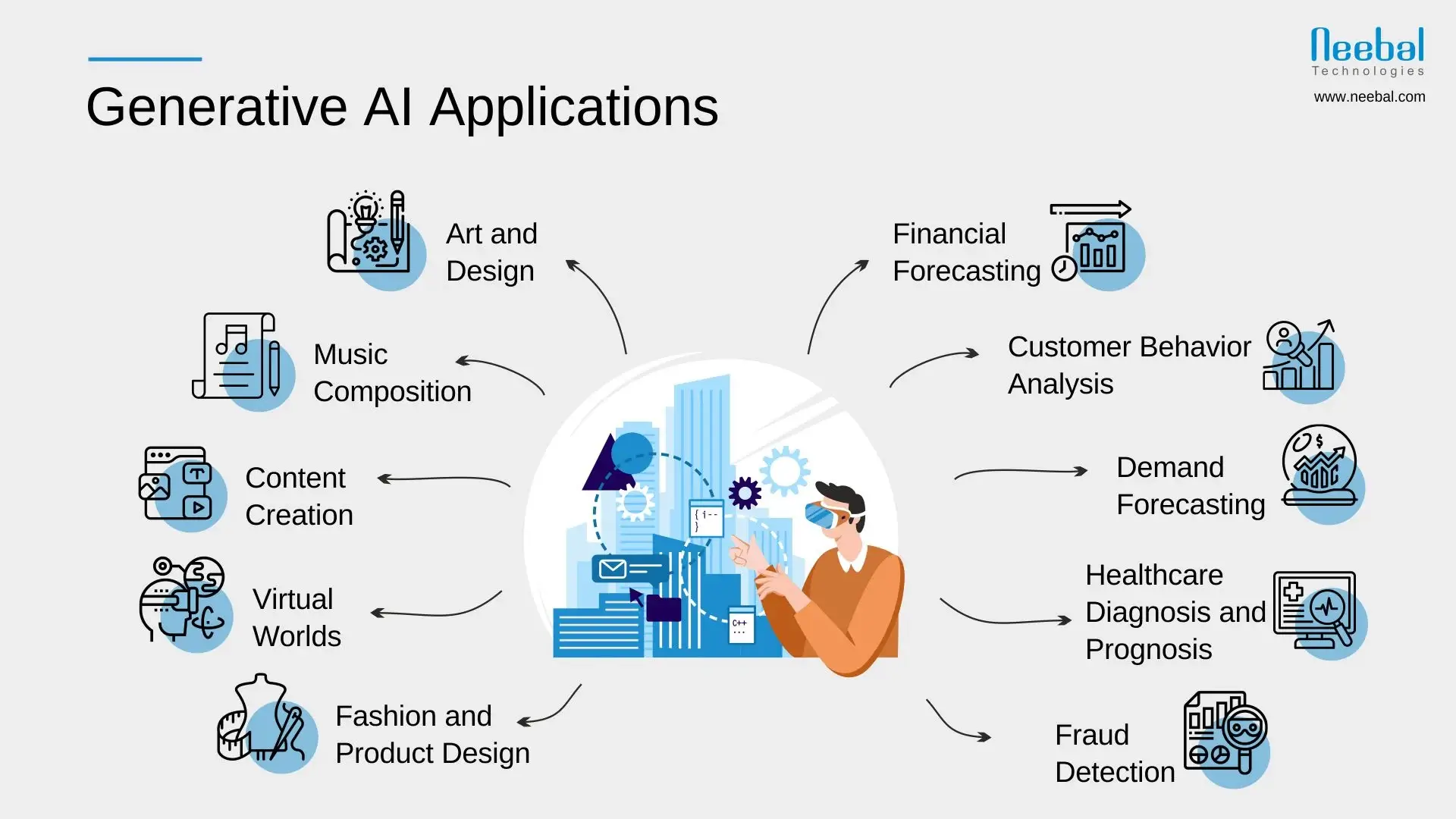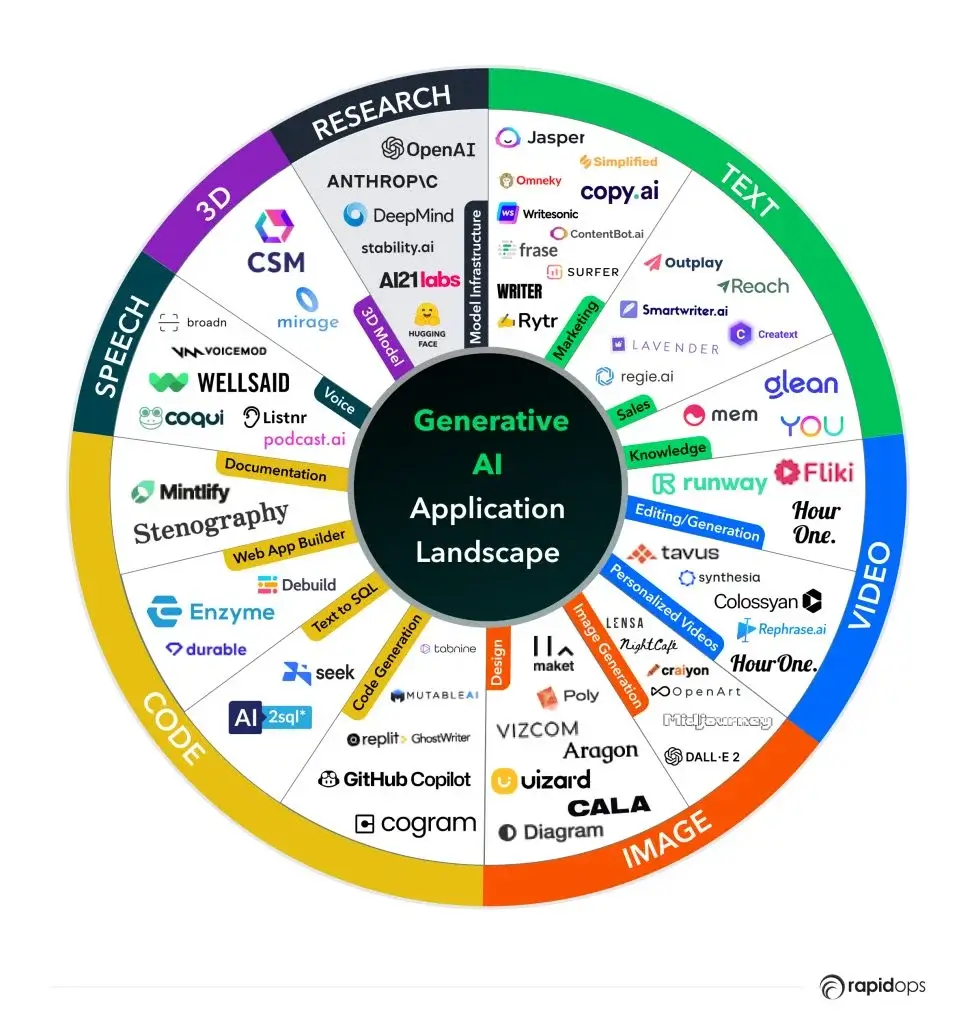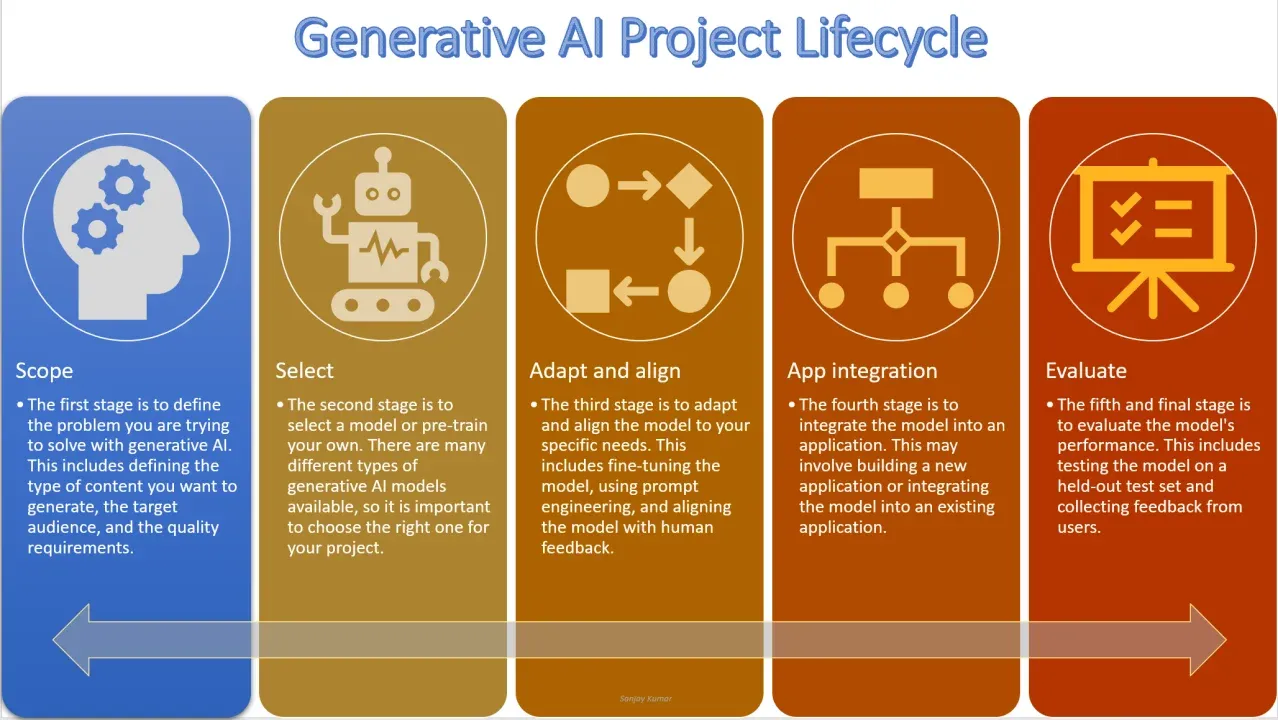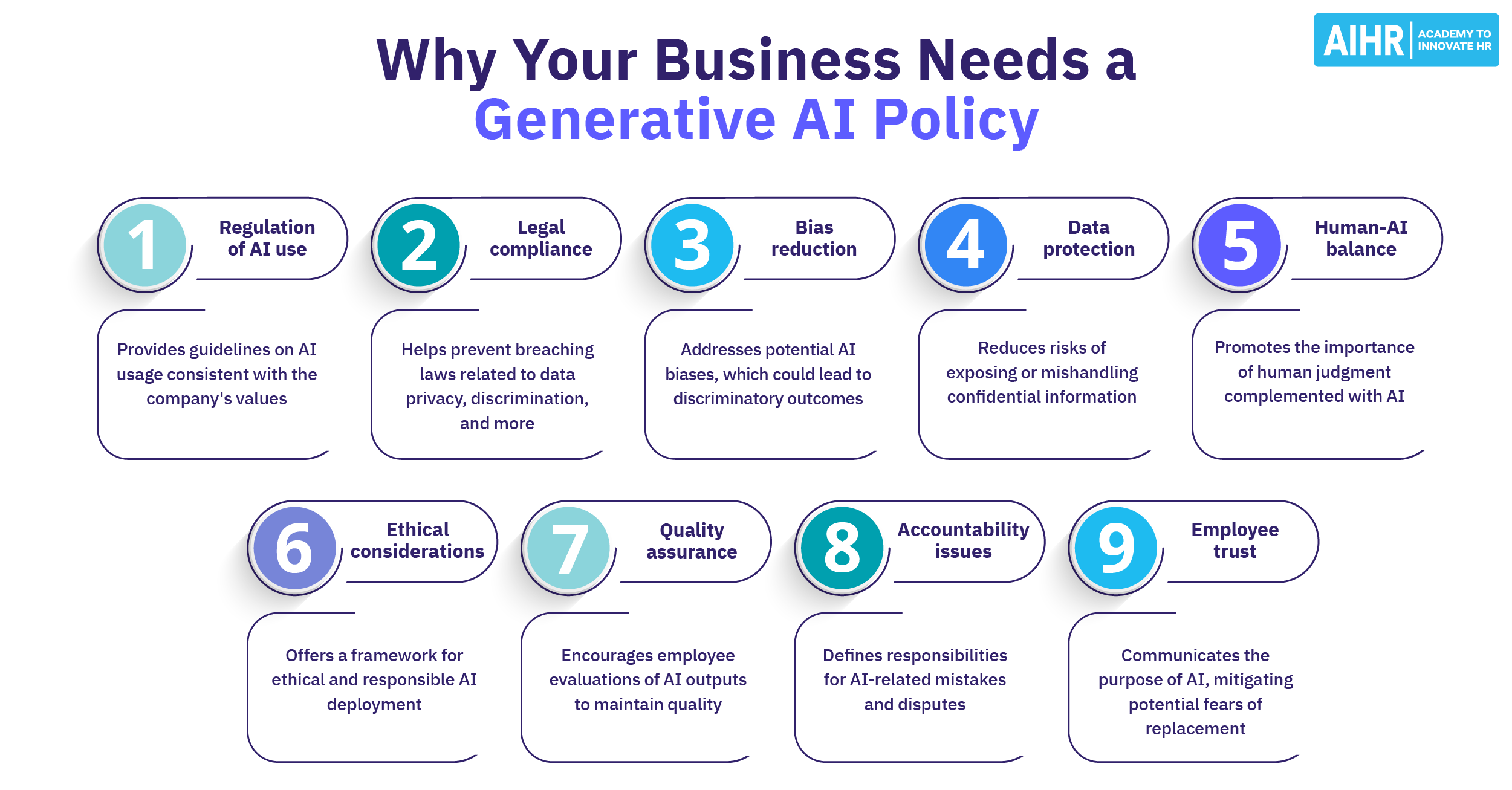Choosing the right Generative AI app can be an overwhelming task, given the increasing number of options available in the market.
However, with the right approach, you can find an app that aligns perfectly with your needs. Understanding your requirements, exploring features, considering ease of use, and evaluating customer reviews are all important factors to consider.
In this guide, we will walk you through the process of selecting the right Generative AI app for you. Continue reading to learn the step-by-step process for understanding your needs, researching options, and selecting the best app.
Let's get started!
Understanding Your Generative AI Needs

Before embarking on any project, it is crucial to understand your needs and objectives clearly. This will help ensure the project is well-planned and executed, ultimately leading to success.
In this section, we will discuss the key elements to consider when understanding your needs for a project.
Identify Your Specific Goals And Objectives
The first step in understanding is to determine the specific goals and objectives you want to achieve. These goals should be clear, measurable, and aligned with your business objectives.
By identifying your goals, you can set a clear direction for your project and ensure that all efforts are focused on achieving these goals.
To identify your goals, ask yourself what you hope to accomplish with the project.
Do you want to increase sales, improve customer satisfaction, or streamline operations? Be specific and define your goals in a way that allows for measurement.
For example, instead of saying "improve customer satisfaction," specify a target percentage increase in customer satisfaction ratings.
Determine the Data Requirements for Your Project
Once you have identified your goals, the next step is to determine the data requirements for your project.
Data is the backbone of any project, and having the correct data is crucial for making informed decisions and ensuring the success of your project. Start by identifying the key data points that are relevant to your goals.
For example, if your goal is to increase sales, you may need data on customer demographics, purchase history, and online behavior.
Consider the sources of this data and whether you have access to the necessary data sources. If not, you may need to explore options for data acquisition or data partnerships.
In addition to identifying the data points, consider the quality and reliability of the data.
Data integrity is essential for accurate analysis and decision-making.
Ensure that the data you have access to is trustworthy and meets your project's requirements.
Consider the Scale and Complexity of Your Project.
Finally, it is essential to consider the scale and complexity of your project when understanding your needs. The scale refers to the size and scope of the project, while the complexity refers to the level of intricacy and difficulty involved.
Assess the resources and capabilities available to you and determine if they align with the requirements of your project.
Consider factors such as budget, time constraints, and expertise. If your project is of a significant scale or complexity, you may need to allocate additional resources or seek external assistance to ensure its successful execution.
By considering the scale and complexity of your project, you can set realistic expectations and plan accordingly. This will help you avoid unnecessary challenges and ensure your project stays on track.
Next, we will move on to the research part.
Researching Generative AI Apps

Generative AI apps have recently gained significant popularity for their ability to create unique and creative outputs.
If you're considering using one of these apps for your project, conducting thorough research is important to provide the right features and capabilities.
This section will discuss the key steps to consider when researching generative AI apps.
Search For Reputable Generative AI App Providers
The first step in researching generative AI apps is to search for reputable providers.
Start by conducting a comprehensive online search, looking for providers specializing in generative AI technology. Consider factors such as their expertise, experience, and reputation in the industry.
Pay attention to well-established providers and those that have received positive recognition or awards. This indicates their commitment to quality and innovation in generative AI technology.
Moreover, it is advisable to look for providers that have been in the market for a reasonable amount of time, as this demonstrates their credibility and stability.
Evaluate the Features and Capabilities of Different Apps
Once you have identified a list of potential generative AI app providers, the next step is to evaluate the features and capabilities of their apps.
Each app may offer different functionalities and produce different outputs, so it's essential to match your requirements with what the app offers.
Consider the app's output types, such as images, text, or music. Determine if the app provides customization options or generates outputs solely based on predefined settings.
Assess whether the app allows for interaction and feedback for better control over the output generation.
Pay close attention to the app's user interface and ease of use. A user-friendly interface can make the app more accessible and enjoyable.
Look for demos or trial versions of the apps to get a hands-on experience and determine if the app meets your expectations.
Suggested Reading:
Read Customer Reviews and Testimonials
To get a better understanding of the effectiveness and user experience of various generative AI apps, it's important to read customer reviews and testimonials. This will provide insight into the app's performance, reliability, and customer support.
Look for reviews on reputable review platforms or forums related to generative AI technology. Pay attention to both positive and negative reviews to get a balanced understanding of the app's strengths and weaknesses.
Consider the specific use cases mentioned in the reviews. If you find reviews from users who have similar needs or objectives as yours, their experiences can provide valuable guidance.
In addition to reviews, look for testimonials from customers who have successfully used the app for their projects. Testimonials often highlight specific benefits or unique features of the app that may align well with your requirements.
Consider the pricing and licensing options
Last but not least, when researching generative AI apps, it's essential to consider the pricing and licensing options.
Determine the pricing models different providers offer, such as monthly subscriptions or one-time purchases. Assess whether the pricing aligns with your budget and the value you expect to gain from the app.
Inquire about additional costs, such as support services or updates, to avoid unexpected expenses.
Consider the licensing terms and restrictions, particularly if you plan to use the app for commercial purposes.
Ensure that the licensing options allow you to use the app in a way that aligns with your intended usage and distribution.
After the research part is done, let us examine the performance of the Generative AI App.
Assessing Generative AI App’s Performance

Once you have done your research and identified potential generative AI apps for your project, it is crucial to assess the performance of these apps. Testing for accuracy, reliability, training, and support, as well as scalability and compatibility, will help you make a well-informed decision.
In this section, we will discuss the key steps to consider when assessing the performance of generative AI apps.
Test the Generative App's Accuracy and Reliability.
One of the most important factors to consider when assessing the performance of a generative AI app is its accuracy and reliability.
It is essential to ensure that the app produces outputs that meet your expectations and are of high quality.
Start by testing the app with various inputs and evaluate the outputs it generates. Consider the level of customization and control you have over the outputs, and assess whether the app consistently delivers accurate and reliable results.
Look for any inconsistencies or errors that may impact the usability or effectiveness of the app.
Furthermore, consider how the app handles various scenarios, like handling incomplete or ambiguous inputs.
A reliable app should be able to handle these situations gracefully and provide meaningful and coherent outputs.
Suggested Reading:
Consider the Training and Support Provided by the App Provider
The training and support provided by the app provider are main considerations when assessing the performance of a generative AI app. App providers should offer adequate training materials, documentation, and resources to help you effectively use the app.
Check if the provider offers comprehensive user guides, tutorials, or video demonstrations that explain the functionality and features of the app. Additionally, consider the accessibility and quality of the support provided. Look for channels such as email, chat, or phone support, and assess the promptness and effectiveness of the provider's responses.
A responsive and knowledgeable support team can significantly impact your experience with the app and ensure that any issues or questions you may have are addressed promptly.
Assess the Generative AI App’s Scalability and Compatibility
When considering a generative AI app, it is essential to assess its scalability and compatibility with your existing systems. Scalability refers to the app's ability to handle increasing workloads or larger datasets effectively. Compatibility refers to its ability to integrate and work seamlessly with your existing software and infrastructure.
Consider your project's future growth and expansion and evaluate if the app can accommodate your needs as they evolve. Look for any limitations regarding dataset sizes, processing power, or concurrent users.
Additionally, consider how the app integrates with your existing systems and workflows. Explore if the app provides APIs or connectors that allow for smooth data exchange and interaction with other software applications you use.
Ensure that the app's scalability and compatibility align with your project's requirements and can support your long-term goals.
When assessing is done the net part is ensuring data security and privacy of the generative AI App.
Ensuring Data Security and Privacy

When researching generative AI apps, it is essential to prioritize data security and privacy.
With the increasing importance of protecting sensitive information, evaluating the app's data encryption and protection measures, considering the provider's data privacy policies, and ensuring compliance with relevant regulations are crucial steps.
In this section, we will discuss how to ensure data security and privacy when selecting a generative AI app.
Evaluate the App's Data Encryption and Protection Measures
Data encryption and protection are essential aspects of ensuring the security of your sensitive information. When assessing generative AI apps, consider the measures taken by each app to protect your data.
Evaluate if the app uses robust encryption algorithms to secure data during storage and transmission.
Look for features like SSL/TLS encryption for data in transit and robust encryption methods like AES (Advanced Encryption Standard) for data at rest. These measures will help safeguard your data from unauthorized access.
Additionally, consider whether the app has mechanisms to prevent data breaches. Look for features such as access controls, authentication protocols, and firewalls that can help protect your data from external threats.
Regular security audits and vulnerability assessments are also positive indicators of an app's commitment to data security.
Consider the Generative AI App Provider's Data Privacy Policies
Data privacy is a critical concern when choosing a generative AI app. Carefully review the app provider's data privacy policies to meet your expectations and requirements.
Look for clear and transparent policies that detail how your data is collected, stored, and used Within the app.
Understand the purpose of the provider collecting your data and whether it is shared with any third parties. Consider if the provider obtains the necessary consents and permissions for data processing, especially when dealing with personally identifiable information (PII).
Ensure that the provider adheres to industry best practices for data privacy, such as data minimization and anonymization.
Assess the measures taken to safeguard your data from unauthorized access or misuse, including policies regarding data retention and deletion.
Ensure Compliance With Relevant Regulations (e.g., GDPR)
Compliance with relevant regulations, such as the General Data Protection Regulation (GDPR), is crucial in choosing a generative AI app. Ensure that the app and its provider comply with the regulations applicable to your location, and industry.
GDPR, for example, sets specific requirements for the processing and protection of personal data. Confirm that the app provider follows GDPR guidelines, especially if you or your users are from the European Union (EU). Compliance with other regulations, such as the California Consumer Privacy Act (CCPA) or Health Insurance Portability and Accountability Act (HIPAA), may be necessary, depending on your specific use case and the data involved.
Review the provider's privacy policies and terms of service to ensure compliance. Consider if they offer contractual commitments regarding data protection and compliance with applicable regulations.
After security is checked, the last step is the final decision.
Making the Final Decision
After thoroughly researching and assessing generative AI apps, it's time to decide.
Comparing the pros and cons of shortlisted apps, considering the provider's reputation and track record, and seeking expert advice will help you make an informed choice.
Compare the Pros and Cons of Shortlisted Generative Apps
- Based on your research and assessment, compare the advantages and disadvantages of the shortlisted generative AI apps.
- Consider app features, usability, performance, data security, and privacy.
- List each app's key benefits and drawbacks to facilitate Comparison.
- Evaluate how each app aligns with your project requirements and objectives.
- Assess how well they meet your functionality, scalability, and customer support expectations.
- Prioritize those apps that offer the most advantageous features and capabilities for your project.
Consider the App provider's Reputation and Track Record
The reputation and track record of the app provider are essential considerations when making the final decision.
Look for providers with a positive reputation within the generative AI community. Consider the provider's experience and expertise in the field.
Search for customer reviews and testimonials from users who have firsthand experience with the app. Look for indications of reliable performance, customer support, and ethical practices. A reputable provider will have a history of delivering high-quality products and services.
Seek Expert Advice if Needed
If you still have doubts or need additional guidance, seek expert advice.
Contact experienced professionals in the generative AI field or consult with trusted colleagues with relevant expertise. They can offer insights and perspectives that help you make a more informed decision.
Expert advice can help you assess the technical aspects of the apps, such as their underlying algorithms and architectures.
It can also guide the reputation and track record of the app providers. Conversation with experts can uncover hidden considerations or potential challenges you may have overlooked.
Conclusion
Choosing a generative AI app is an important decision.
By understanding your needs, researching top options, and assessing security, performance, and policies, you can find the best fit. Compare the pros and cons to see which app truly supports your goals.
Consider a provider's reputation - their experience ensures quality. If unsure, talk to experts for impartial views. Their insights confirm your selection.
The right app empowers your success. Take time to evaluate thoroughly. Your selection impacts your work for years to come. Find the one enabling your vision.
Suggested Reading:
Frequently Asked Questions (FAQs)
What factors should I consider when choosing a generative AI app?
Consider factors like usability, compatibility with your devices or systems, available features, pricing models, customer support, and the specific functionalities aligned with your needs.
Are there different types of generative AI apps available?
Yes, generative AI apps vary based on their applications, such as art generation, content creation, design tools, and specialized industry-focused solutions.
Can I try a generative AI app before purchasing?
Many apps offer free trials or demo versions, allowing users to explore functionalities and assess suitability before purchasing.
What pricing models are shared among generative AI apps?
Pricing models range from one-time purchases to subscription-based or freemium models; understanding these can help budget and choose the right fit.
Do generative AI apps require specialized hardware or software?
While some apps may have specific requirements, many are designed to run on standard devices, but checking minimum specifications is advisable.
Are there security and privacy considerations with generative AI apps?
Look for apps with robust security measures, data encryption, and transparent privacy policies to safeguard sensitive information.



